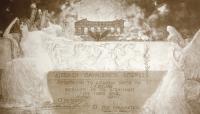John Pius Boland’s Olympic tennis diploma
Published in 20th-century / Contemporary History, Features, Issue 4 (July/August 2012), Volume 20
Designed by Nikolas Gyzis, the diploma depicts the strong links that existed in the minds of the Greek organisers between their event and the ancient Olympic Games. (Peter Smithwick)
When John Pius Boland, born in Capel Street, Dublin, went to Athens for the first modern Olympic Games in 1896 he did so as a scholar-tourist, seeking respite from a semester of study at the University of Bonn and, previous to that, his studies for a postgraduate law degree in Oxford. While in Athens, following a social gathering with some friends, both Greek and English, the Dubliner decided to give the Olympic tennis event a go. There were no recognised tennis players in the competition and, despite having to purchase or borrow every item of clothing and equipment he needed, this decision was to result in Boland’s becoming the first Olympic tennis champion, in singles and doubles, and the first Irish-born champion of the modern games into the bargain. The word ???Ω (pronounced apló) on Boland’s diploma shows that it was for the singles event—we have no record of what became of the doubles diploma. The signatures of Crown Prince Constantine and Timoleon Philemon, respectively president and secretary of the organising committee, are also clearly visible. The diploma was accompanied by a winner’s silver medal and a crown of olives. Boland’s diary records him walking around after the presentation and being asked for souvenir leaves from one of his olive crowns by passing Greek girls, to the extent that in the end little remained of the crown itself.Designed by Nikolas Gyzis, the diploma depicts the strong links that existed in the minds of the Greek organisers between their event and the ancient Olympic Games. Although it shows the Parthenon of Athens rather than the ruins of Olympia, and is written in modern rather than classical Greek, details like an ancient Olympic chariot race and figures representing Nike, goddess of victory, and Greece (Hellas) itself were direct links with the ancient games. There was a political message in the diploma’s design also. Rather than an image of the beautifully restored Panatheneian stadium in Athens, the designer (and organising committee) chose the Parthenon, symbol of Greece and of Greek freedom and democracy. This was no accident, with the games of 1896 falling in the very week that Greece celebrated the 75th anniversary of independence from Turkish rule, at a time when the nation looked longingly towards completing the job and incorporating into a greater Greece some city states and Turkish-ruled areas to the north. The greatest celebration in Athens on the day Boland received his diploma was for the Greek Spiridon Loues’ victory in the marathon—on one level just a 26-mile race but also a reminder of the greatest victory ever won by Greece in its wars with Persia, almost 24 centuries before.The political issues did not stop with the messages on Boland’s diploma. While in Athens, Boland had fraternised mainly with fellow students from Oxford and had, in every respect, been considered English. He was entered as the Olympic victor ‘I. P. Boland, England’ in the official report of the 1896 Olympic organising committee. Nor did Boland seem to mind being considered an Englishman at the time; commenting in his diary on the celebrations after the award ceremonies, he referred to himself more than once as ‘English’ and on one occasion mentioned that ‘we English gave the king a rousing hip, hip, horray’. The sense that one was representing one’s native country was not anything like as clearly defined in 1896 as it became in later international sporting events, and Ireland was, after all, part of the United Kingdom. It was only when Boland returned to Oxford and found one of his fellow Athens competitors ascribing the tennis victories to ‘England’ in the pages of the Oxford Magazine that Boland’s Irishness surged to the fore, provoking the response: ‘I refuse to forswear my “Hibernian origin” and the green flag in the field of sport’.Boland’s Olympic experience appears to have spurred him towards a greater awareness of his Irish identity, which lasted all his life. He went on to become Irish Parliamentary Party MP (until 1918). He also learnt Irish and was instrumental in having it made a compulsory matriculation subject for the National University of Ireland. As to his subsequent tennis ‘career’, while Boland never again played a serious competitive match, he did continue to play the game recreationally until shortly before his death, at the age of 88, and in fact met his future wife at a tennis tournament in France just a year after the Athens Olympics. HI
Cyril M. White is a retired UCD and American College professor and dean, with a lifelong interest in sport and sports scholarship.
Further reading:
H. Gillmeister (ed.), From Bonn to Athens, single and return [Boland’s diary] (Sankt Augustin, 2008).K. McCarthy, Gold, silver and green: the Irish Olympic journey, 1896–1920 (Cork, 2010).
















